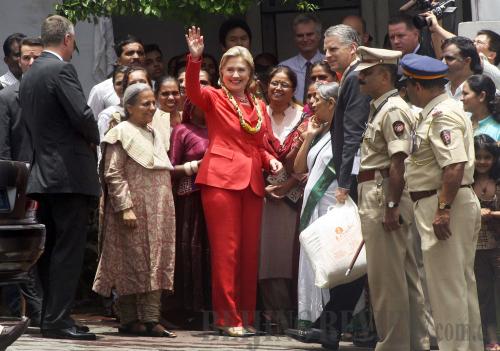|
The Pakistan challenge
China policy aside, the greatest challenge the United States and India will face in growing their partnership is the ongoing Indo-Pakistani regional rivalry. President Obama got off to a rough start with the Indians because of a comment he made last year on the campaign trail, hinting that he would consider appointing a Kashmir envoy. Many Indians viewed the comment as reflective of a Pakistani view of the region.
 |
|
WARM GREETINGS: Hillary Clinton waves to Indian crowds in Mumbai on July 18 during her first visit to India as the U.S. secretary of state (XINHUA) |
Indians were also taken aback by references in U.S. Commander in Afghanistan General Stanley McChrystal's report describing India's role in Afghanistan as provocative toward Pakistan. By dint of history, the United States and India find themselves supporting mutual goals in Afghanistan, including the development of a stable democratic government that will prevent the Taliban and its extremist affiliates from regaining power. President Obama's expression of gratitude to India for its assistance to the Afghan people was thus important as it tacitly acknowledged that he does not view Afghanistan through a Pakistani lens.
The two leaders also took note of their growing counterterrorism cooperation. U.S.-India coordination following last year's Mumbai attacks was unprecedented, and broke down many bureaucratic walls between the two countries' intelligence and law enforcement agencies.
The recent investigations of the David C. Headley case offer further opportunity to enhance U.S.-India counterterrorism cooperation. Headley was arrested in Chicago in early October for allegedly plotting with the Lashkar-e-Tayyiba (LeT) in Pakistan to attack India and Denmark. The case demonstrates that LeT is not solely a problem for India but is part of the international terrorist network that threatens all civilized countries.
The terrorism issue is particularly salient when it comes to efforts to improve the overall dynamics of the Indo-Pakistani relationship, a key goal of the Obama administration. Any initiative by Obama to try to reduce tensions between Islamabad and New Delhi should include convincing Pakistan to prosecute the Mumbai attackers, arrest LeT leader Hafiz Muhammad Saeed, and shut down the operations of this terrorist group. Obama made clear that the United States is not pushing for direct mediation between India and Pakistan, but would instead help both countries feel more secure.
Reaffirming ties
President Obama rightly took advantage of an opportunity to reaffirm ties to India and recognize the U.S.-India partnership as one of the "defining partnerships of the 21st century." The two countries now need to follow through on their leaders' pronouncements on a range of issues including education, trade, health, energy, defense, nuclear non-proliferation, space and the environment. More specifically, the Obama administration should:
l Support India as a stabilizing force in Asia by agreeing to deepen military-to-military ties through new defense trade deals and a commitment to increasingly complex and robust military training exercises. Military ties should focus particularly on increased naval cooperation to secure sea lanes of communication in the Indian Ocean region.
l Maintain commitments to carrying forward the civil nuclear deal initiated under the previous Bush administration. Obama clarified that his support for strengthening the Nuclear Non-proliferation Treaty and for ratifying the Comprehensive Test Ban Treaty does not translate into a desire to roll back civil nuclear commitments made to India under the previous Bush administration. This was an important indication of his personal commitment to the deal, but he needs to follow through on that commitment.
l Continue to acknowledge India's helpful role in promoting development and democracy in Afghanistan without supporting India gaining a strategic foothold in Afghanistan at Pakistan's expense. The idea is to support the types of positive activities India is involved with in Afghanistan and to encourage Pakistan to follow suit. Obama should express support for cooperative initiatives between India and Pakistan in Afghanistan and push the two countries to increase overall trade and economic linkages as well as military-to-military contacts and counterterrorism cooperation.
The author is a senior research fellow for South Asia in the Asian Studies Center at The Heritage Foundation in Washington, D.C.
(The viewpoints in this article do not necessarily represent those of Beijing Review) | 